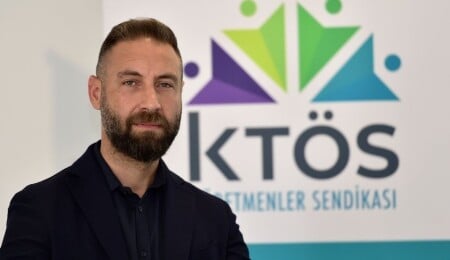Maviş: 21% of Students Are Taught in Container Classrooms, 18% in Schools Still Under Construction

General Secretary of the Cyprus Turkish Teachers’ Union (KTÖS) Burak Maviş revealed that 21% of students are being taught in container classrooms, while 18% are attending lessons in schools still under construction.

Speaking on Kıbrıs Postası TV’s “Gündem” programme hosted by Ulaş Barış, Maviş marked World Teachers’ Day by highlighting the pressing challenges facing education in the country.
Maviş explained that October 5 is recognised internationally as World Teachers’ Day, commemorating the 1966 ILO-UNESCO joint recommendation that established the professional status of teachers. He also reminded that KTÖS, founded before 1974, is a registered union and a member of the European Trade Union Committee for Education (ETUCE).
He emphasised the importance of international solidarity, noting that joint messages from unions on both sides of the island reaffirm support for a bi-communal, bi-zonal federation as a solution to the Cyprus problem.
While celebrating the day with teachers, Maviş said the union also uses the occasion to raise awareness about ongoing problems. “We said we wouldn’t engage in politics, but in this country, there’s an election almost every year. We live in a constant campaign atmosphere,” he remarked.
Citing recent data, Maviş stated that 21% of students are in container classrooms and 18% are studying in schools still under construction. “These conditions are challenging not only for students but also for teachers,” he said, adding that staff shortages and poor infrastructure continue to disrupt educational activities.
“Student Numbers Have Risen by Around 500”
Maviş said structural issues persist in education, including the lack of reliable data. “Compared to last year, there’s an increase equivalent to 25 new classes—around 500 students. We’re seeing a major shift from private to public schools,” he noted, warning that budget and staffing shortfalls are worsening as enrolment continues.
He also recalled that as early as 1951, Halkın Sesi newspaper reported a need for new schools, while in 2012 the issue of teacher shortages was raised. “These needs still exist today,” he said.
“Foreign Student Ratio Has Reached 10%”
“The percentage of foreign students was 1% in 2007; today, it’s 10%,” Maviş stated. “There are students from 45 different countries studying in public schools. Yet 47% of schools have no special education teachers, and 57% have no guidance counsellors,” he added.
“Classrooms Are Overcrowded”
Highlighting the lack of space in schools, Maviş said: “In 27 schools, the number of students per class ranges from 26 to 35. A 48-square-metre classroom should hold 24 students, but ours have 30–35. To meet standards, we need at least 10 new schools.”
He added that 18.5% of primary school students attend private institutions—well above the global average of 15%. “In Northern Europe, where governments invest in education, private schooling is rare. Here, inflation forces families to finance education themselves,” he said.
“Container Classrooms Were Never Meant for Education”
Maviş criticised the continued use of container classrooms, saying they were never designed for teaching. “Two years later, lighting, insulation, and noise problems remain unresolved. If electricity or air conditioning fails, lessons can’t continue,” he warned.
He noted that the number of container classrooms is increasing, reducing playground space and eliminating facilities like laboratories, art, and music rooms. “Education is not only academic—it’s social. Yet these essential spaces are disappearing,” he said.
“Education Should Not Be a Political Tool”
Calling for education to be depoliticised, Maviş stated: “We’re still talking about primitive problems, as if education were a new invention. That’s tragic. Education should not become an election promise.”
He gave the example of Suat Günsel Primary School, originally planned with 10 classes and 4 subject rooms, now overcrowded with 20 classes and 600 students. “Containers were added, and labs, libraries, and music rooms were converted into classrooms,” he said.
“Negligence Has Become a Rights Violation”
Maviş also criticised high school canteen prices and the Ministry of Education’s lack of intervention. “Education is a right. If schooling is compulsory until age 15, the state must provide food and water. The minister’s negligence has turned into a violation of rights,” he concluded.


Comments
Attention!
Sending all kinds of financial, legal, criminal, administrative responsibility content arising from illegal, threatening, disturbing, insulting and abusive, humiliating, humiliating, vulgar, obscene, immoral, damaging personal rights or similar content. It belongs to the Member / Members.